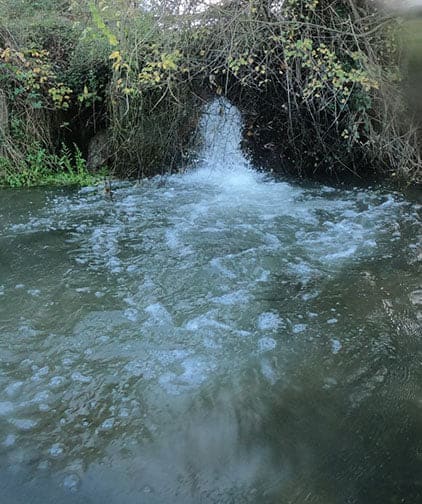Cllr Andrew Doherty
Liberal Democrat Councillor for Fairford North Ward on Cotswold District Council Learn more
River quality & pollution
by andrewdoherty on 5 December, 2020

River quality and pollution: Three things YOU can do (more details below).
1) Show support for the “Sewage (Inland Waters) Bill” – help improve the law. 2) Make sure your roof is not adding to the problem – where does your rainwater go? 3) Stick to the “3Ps” – think about the chemicals and substances you put in the sewer. Support the “Sewage (Inland Waters) Bill” – help improve the law: One MP is trying to get the law changed to start improving the dismal legal framework that governs water companies and sewage. Write to our MP (Cotswolds – www.cliftonbrown.co.uk) to insist that he supports this private members bill (https://bills.parliament.uk/bills/2625) when it has its second reading on the 15th January 2021.Make sure your roof is not adding to the problem – where does your rainwater go? Too much water at the treatment works – rainwater in sewers and high groundwater flooding sewers – is the most common cause of untreated sewage being discharged to the river. If your downpipes connect to the sewer system, then that is adding to the problem during heavy rain (more on this in another post …)Stick to the “3Ps” – think about the chemicals and substances you put in the sewer: Pee, pooh and paper (3Ps) are all that should go in, but people add all sorts of chemicals to drains and toilets and it all ends up in our rivers. A working sewage works can treat human waste effectively, but they cannot filter out everything, and they rely on bacteria to do a lot of the treatment work. An alcohol-based hand sanitiser obviously makes sense during COVID-19, but what is the need for powerful bactericidal toilet cleaners? Who drinks out of the toilet bowl? All those chemicals wash through the works and into the river (more on this in another post …)There is absolutely no mystery about why this is happening – a failure to invest in sewage infrastructure, poor legal protections, inadequate monitoring, perverse financial incentives, and ineffective regulation have been described by others many times already: WWF’s Flushed Away report in 2017 (https://www.wwf.org.uk/…/Flushed%20Away__Nov2017.pdf) is a long read, but a really good place to read why this is – and why it didn’t have to be like this. Windrush Against Sewage Group (Windrush Against Sewage Pollution) have written extensively about what has happened on their local river and how those problems are repeated on rivers all over England. The River Trusts (https://www.theriverstrust.org/…/shocking-facts-about…/)Surfers against Sewage (https://www.sas.org.uk/)… and it is not just sewage. At least a third of the pollution problems in rivers are thought to come from agricultural run-off (fertilisers, insecticides, herbicides, fungicides, etc.). The choices we make in our gardens (all the -ides again) flow through to our rivers. Everything ends up in our rivers. So, if you want to add to the three original suggestions you can also try …4) Encourage more sustainable farming practices – more organic and wildlife friendly products where you can5) Lose the chemicals in your garden – overuse of insecticides is decimating insects everywhere and that is happening in our rivers, as well as on land and in the skies. Note: In my CDC role I visited the treatment works in Fairford and in Cirencester (Shorncote) in 2020 to see what actually happens at the works – but the 1st lockdown kicked in about a week later so I hadn’t yet written up a full description of what is happening there. Wil add a separate post that talks about what should happen, and why it goes wrong, at the treatment works.

Leave a Reply